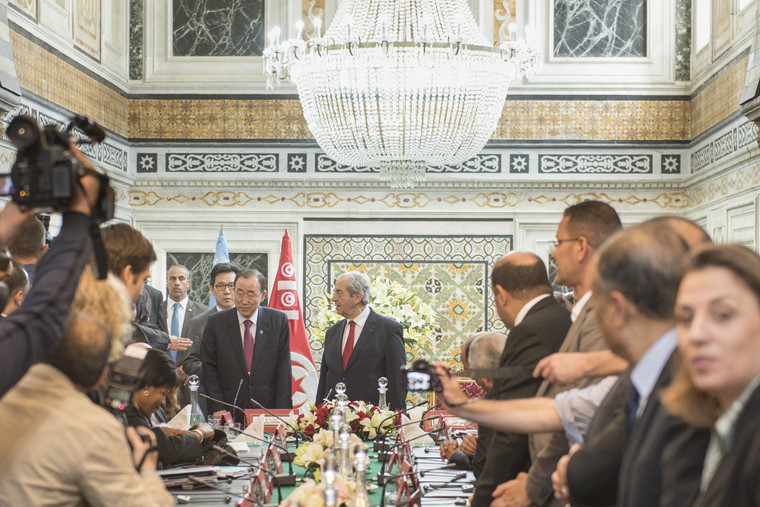In Tunisia, Ban welcomes country's democratic progress
| Publisher | UN News Service |
| Publication Date | 28 March 2016 |
| Cite as | UN News Service, In Tunisia, Ban welcomes country's democratic progress, 28 March 2016, available at: https://www.refworld.org/docid/56fb848e40d.html [accessed 22 May 2023] |
| Disclaimer | This is not a UNHCR publication. UNHCR is not responsible for, nor does it necessarily endorse, its content. Any views expressed are solely those of the author or publisher and do not necessarily reflect those of UNHCR, the United Nations or its Member States. |
28 March 2016 - While in Tunisia's capital today, Secretary-General Ban Ki-moon welcomed the country's democratic progress while reaffirming the United Nations' support to its citizens and Government.
“[World Bank President] Kim and I are here to show our support to Tunisia, where progress towards stability and prosperity are advancing despite significant economic and security challenges,” the UN chief told reporters at a press conference in Tunis.
“We've just met with his excellency President Beji Caid Essebsi. I congratulated him for the democratic progress made in Tunisia. I also lauded his efforts to reduce social and economic inequalities. I assured him that the United Nations supports Tunisia's citizens and Government at a time when the country is in transition,” he added.
Mr. Ban noted that unemployment, especially among youth, is one of the biggest challenges affecting Tunisia. “I am impatient to hear young people tell me in person about their fears and the kind of help or support they need,” indicated the UN chief, who will be attending a national conference on employment tomorrow, organized by the Tunisian Prime Minister.

Secretary-General Ban Ki-moon, Mohamed Ennaceur, President of the Assembly of the Representatives of the People of Tunisia, and World Bank President Jim Yong Kim make their way to a wreath-laying ceremony at the Bardo National Museum. UN Photo/Mark Garten

Secretary-General along with (from left) World Bank President Jim Yong Kim, Sonia M'Barek, Minister of Culture of Tunisia, and Yoo Soon-taek, observe a moment of silence. UN Photo/Mark Garten

Secretary-General Ban Ki-moon lays a wreath at the Bardo National Museum in Tunis, marking the first anniversary of the 18 March 2015 terrorist attack at the museum. UN Photo/Mark Garten

Secretary-General Ban Ki-moon (centre left) meets with Mohamed Ennaceur, President of the Assembly of the Representatives of the People of Tunisia. UN Photo/Mark Garten

Secretary-General Ban Ki-moon (right) and World Bank President Jim Yong Kim, jointly address journalists following their meeting with President Béji Caïd Essebsi of Tunisia. UN Photo/Mark Garten

Secretary-General Ban Ki-moon (right) chats with Martin Kobler, his Special Representative and Head of the UN Support Mission in Libya (UNSMIL). UN Photo/Mark Garten

Secretary-General Ban Ki-moon (left) meets with Habib Essid, Head of Government of Tunisia, in Tunis. UN Photo/Mark Garten

Secretary-General Ban Ki-moon (right) meets in Tunis with Mousa Al Kony, Deputy Prime Minister of the Libyan Government of National Accord. UN Photo/Mark Garten
“The United Nations I ready to continue its collaboration with the Government of Tunisia to build on programmes that creates jobs and reduce inequalities,” he stressed.
In addition to meeting the President, Mr. Ban and Mr. Kim are scheduled to meet Prime Minister Habib Essid, as well as the President of the Assembly of the Representatives of the People, Mohamed Ennaceur. Talks are expected to focus on concrete proposals to generate economic results that benefit the Tunisian population, especially relating to job creation and economic support.
At the press conference, the Secretary-General also expressed the global community's concern about the terrorist attacks that recently targeted Tunisia.
“The United Nations recognizes the impact of the situation in Libya on Tunisia, in particular on its economy and security. We are working towards a political solution in Libya. This remains the only way to end the crisis and to stabilize both the country and the region,” he concluded.
